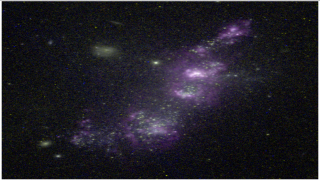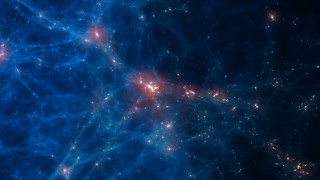Bibcode
Sánchez Almeida, J.; Dalla Vecchia, C.
Referencia bibliográfica
The Astrophysical Journal, Volume 859, Issue 2, article id. 109, 17 pp. (2018).
Fecha de publicación:
6
2018
Revista
Número de citas
26
Número de citas referidas
25
Descripción
For the same stellar mass, physically smaller star-forming galaxies are
also metal richer. What causes the relation remains unclear. The central
star-forming galaxies in the EAGLE cosmological numerical simulation
reproduce the observed trend. We use them to explore the origin of the
relation assuming that the physical mechanism responsible for the
anticorrelation between size and gas-phase metallicity is the same in
the simulated and the observed galaxies. We consider the three most
likely causes: (1) metal-poor gas inflows feeding the star formation
(SF) process, (2) metal-rich gas outflows particularly efficient in
shallow gravitational potentials, and (3) enhanced efficiency of the SF
process in compact galaxies. Outflows (cause 2) and enhanced SF
efficiency (cause 3) can be discarded. Metal-poor gas inflows (cause 1)
produce the correlation in the simulated galaxies. Galaxies grow in size
with time, so those that receive gas later are both metal poorer and
larger, giving rise to the observed anticorrelation. As expected within
this explanation, larger galaxies have younger stellar populations. We
explore the variation with redshift of the relation, which is maintained
up to, at least, redshift 8.
Proyectos relacionados

Grupo de Estudios de Formación Estelar GEFE
El proyecto interno GEFE está enmarcado en el proyecto coordinado, ESTALLIDOS, financiado por el plan nacional desde el año 2001. El ultimo proyecto aprobado es ESTALLIDOS 6.0 (AYA2016- 79724-C4-2-P). En el proyecto GEFE trabajamos en base al caso científico del proyecto ESTALLIDOS 6.0. Los estallidos de formación estelar (Starbursts o SB) son
Casiana
Muñoz Tuñón

Astrofísica Numérica: Formación y Evolución de Galaxias
Entre las cuestiones fundamentales en Astronomía y Astrofísica están la formación y evolución de galaxias. Las escalas de tiempo y tamaño son tan astronómicas que su observación en galaxias individuales es imposible. Solo con el uso de simulaciones numéricas es posible entender la formación de estructuras cósmicas dentro del actual marco
Claudio
Dalla Vecchia